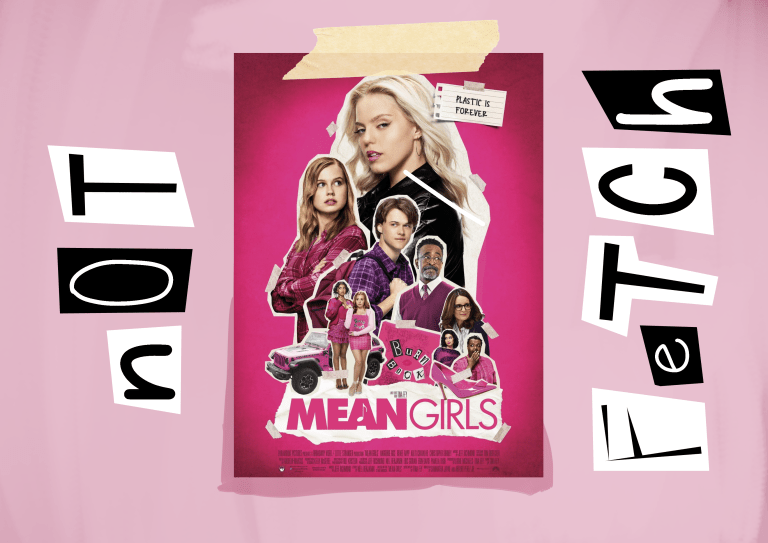Editor’s Note: This article is a review and includes subjective thoughts, opinions and critiques.
Why can’t many recent movie musicals resonate with audiences? It’s not because they wore the wrong color on Wednesdays, or even because they wore sweatpants to class on a Monday. No, it’s because in the world of Hollywood, movie musicals have become Cady Heron desperately trying to please Regina George.
Movie musicals such as “Mean Girls” (2024), “Wonka” (2023) and “Cats” (2019) seem to be everywhere in recent years. But for a variety of reasons, these movie musicals have not satiated the appetite of us theater kids. Why? Let’s focus on “Mean Girls” as an example.
The 2024 movie is a screen adaptation of a 2018 Broadway musical… Yet the trailer gave few to no hints that the film is an adaptation of the musical, not a remake of the 2004 movie. The trailer opens with a short snippet of Renee Rapp singing “My Name is Regina George,” but there are no other musical scene. This is not only misleading, but risks frustrating moviegoers who are not musical fans.
Though you’d think that musical fans would be overjoyed to see fan favorites on movie screens, often we leave just as disappointed. Stage musicals lean into the over-the-top craziness of randomly breaking into song. Musicals on stage don’t bother trying to appeal to people who don’t want to watch a musical — why would they? Theater kids wanted to see Renee Rapp hit the vocal riffs in the trailer. They wanted the original dance sequences and songs. “Mean Girls” here is yet another example of a modern movie musical falling short.
It’s not entirely the fault of directors and producers: It just isn’t possible to reproduce on screen the dynamic between a live audience and actors. Filmmakers sift through countless takes to find the perfect one, while actors on stage adapt and improvise in the moment.
Sure, Broadway musicals are strenuously vetted. TikTok famous musicals like “Heathers” (2014) and “Ride the Cyclone” (2008) both played off-Broadway, but never on Broadway, but every time they’re put on, they’re inherently new. Though movies can change with each watch, the actors can’t make new decisions months, or even years, after filming.
The solution? Let musicals be musicals. Not everything has to appeal to all audiences and if a musical movie is good enough, then it will draw people to the box office on its own merit.
Two prime examples are “La La Land” (2016) and “West Side Story” (2021). These Oscar-winning films are living proof that movie musicals can succeed. Striking the proper balance between cinematic acting, musical-style song interpretation and appealing to non-musical theater fans isn’t easy, but these films show that it is possible.
One of the key factors is their casting. The lead actors of “La La Land,” an original musical, were the best of both worlds. A-listers Emma Stone and Ryan Gosling lent both star power and talent; they prepared for their roles with intensive voice and dance lessons. Gosling even took six months of piano lessons in order to do all his own piano playing in the movie. In “West Side Story,” Ansel Elgort (Tony) trained in ballet while growing up, while Rachel Zegler (Maria), had years of experience in musical theater.
With all the negative mentions of “Mean Girls” in this article, it’s worth mentioning they did get some things right. For instance, the inspired casting of Renee Rapp, who won a national musical theater award in high school and went on to play Regina George on Broadway at the age of 19. However, a movie is only as good as its weakest link and unfortunately, I believe that the weakest link was the main character, Cady Heron, played by Angourie Rice.
Angourie Rice’s rendition of “Stupid With Love” was rewritten to be much softer and more ‘pop’ sounding than the original, making it seem as though she struggled to portray the same emotion as the original Broadway actress. The original version by Erika Henningsen in the Broadway musical is overkill in terms of expressiveness, but it conveys unapologetically the character’s feelings and what they’re trying to say, which can’t be said for Rice’s version.
As a former theater kid, if you asked me what I want movie musicals to be, I’d say I want them to stop pretending to be something they’re not. Movies don’t have to please everyone: Some people really love some stories, while others hold strong negative feelings towards them. And that’s okay. These musicals, though, should be allowed to speak, or rather sing, for themselves.
Until those creating movie adaptations of beloved musicals realize that their films only succeed when they aren’t trying to fit a mold, they will keep being told that they can’t sit with us.
